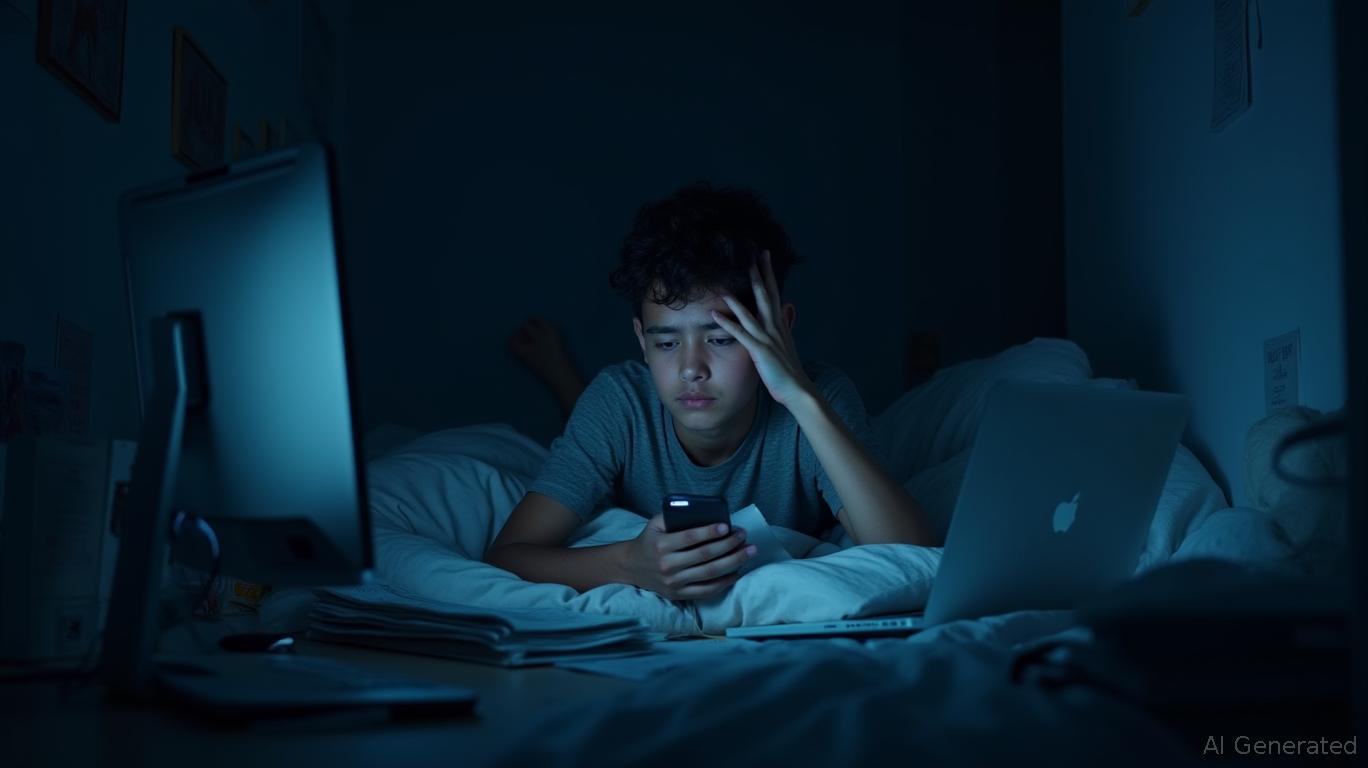Gen Z Faces Sleepless Nights and Endless Screen Time Due to Financial Anxiety
- 70% of Gen Z experience sleep disruption from severe financial stress, with 69% lying awake over rising costs and job insecurity. - Passive coping like "bed rotting" (37%) and screen time (57%) replaces proactive budgeting, worsening mental health and sleep cycles. - High student debt ($94k avg), stagnant wages, and 63% monthly cash shortages highlight systemic financial instability for this generation. - Experts urge practical solutions like automated savings and "worry windows," but 55% lack emergency

Source: [1] 70% of Gen Z Are So Anxious About Money They Can’t Sleep—They’re Dealing With It by Bed Rotting and Watching TV Instead of Budgeting [2] Gen Z Faces Financial Challenges, Stress, Anxiety and an Uncertain Future [3] Gen Z's Financial Wake Up Call: Budgeting, Saving, and... [4] Gen Z's Financial Anxiety: Budgeting, Stress, and the Shifting... [5] Gen Z is Suffering a 'Midlife Crisis' Due to Job, Financial Stress: Study [6] The New Money Mindset: Gen Z Is Treating Finances... [7] Gen Z Faces Financial Challenges, Stress, Anxiety and an... [8] Gen Z Faces the Worst Financial Crisis of Any Generation as Soaring... [9] Gen Z's Financial Reality as Nearly Half Run Out of Money... [10] Sleepless Over the Economy: How Recession and Tariff Fears... [11] The Rise of Bed Rotting: How and Why Americans Are... [12] New Report Shows Gen Z Has More Serious Sleep...
Recent research indicates that seven in ten members of Generation Z (born between 1997 and 2012) experience such significant financial stress that it disrupts their sleep. Instead of taking active steps to manage their finances, many turn to avoidance behaviors such as "bed rotting" and extended screen time. According to a 2025 study by Amerisleep, almost half of Americans link financial worries to sleep issues, with Gen Z being the most susceptible—69% report lying awake at night, troubled by inflation, rent, and unstable job prospects. This reflects a larger pattern: between 50% and 70% of Gen Zers are deeply worried about money shortages, naming student loans, stagnant pay, and frequent layoffs as primary sources of anxiety.
These financial concerns are intensified by underlying structural obstacles. More than 60% of Gen Zers juggle several jobs or side gigs just to get by, yet 63% still run out of funds each month, and nearly half must rely on family help to pay for necessities such as rent and food. On average, Gen Z’s student debt is $94,101, much higher than the $59,181 carried by millennials, adding further financial strain. Meanwhile, 47% of Gen Z say their sleep has deteriorated since 2025 began, often attributing this to inflation and uncertainty over trade policies.
To manage their stress, many in Gen Z have adopted avoidance tactics. The 2025 Amerisleep survey found that 37% engage in "bed rotting"—remaining in bed for long periods—to escape money worries, while 57% use social media or watch TV as distractions. However, experts caution that these habits can worsen the situation, as too much screen time and inconsistent sleep can harm mental well-being, creating a repeating cycle of anxiety and sleeplessness.
Even so, some Gen Zers are taking steps to strengthen their financial position. Bank of America’s 2025 Better Money Habits survey found that 72% are making deliberate efforts to improve their financial health, such as setting up automatic savings and seeking diverse income streams. Still, only a quarter contributed to retirement accounts in the past year, and 55% do not have enough savings to cover three months’ worth of expenses. Experts recommend practical measures like scheduling a set time during the day to think about financial issues, reducing screen time before sleep, and focusing on attainable goals such as building an emergency fund.
The overlap between financial stress and mental health points to a larger issue. McKinsey’s research shows that Gen Z reports the poorest mental health compared to other generations, with 38% saying economic instability has caused a “midlife crisis.” Social media’s role in promoting consumerism and unrealistic ideals further intensifies anxiety, as Gen Z compares themselves to idealized online images. While 61% consider financial well-being a key part of self-care, persistent challenges like unaffordable housing and stagnant wages continue to be major barriers.
The evidence paints a picture of a generation facing unique economic hardships, trying to find new ways to balance money management and mental health. As Gen Z navigates these challenges, experts call for a combination of personal action—such as budgeting and financial education—and broader systemic reforms to address the root causes of their stress.
---
: [1] title1 [2] title2 [3] title3 [4] title4 [5] title5 [6] title6 [7] title7 [8] title8 [9] title9 [10] title10 [11] title11 [12] title12
Disclaimer: The content of this article solely reflects the author's opinion and does not represent the platform in any capacity. This article is not intended to serve as a reference for making investment decisions.
You may also like
New spot margin trading pair — BARD/USDT!
BTC/ETH VIP Earn Ultimate Carnival is officially here!
New spot margin trading pair — FLOCK/USDT!
0GUSDT now launched for pre-market futures trading